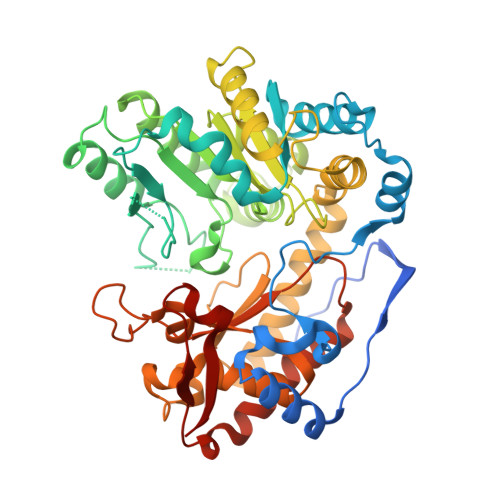Mechanism-based inhibition of gut microbial tryptophanases reduces serum indoxyl sulfate.
Graboski, A.L., Kowalewski, M.E., Simpson, J.B., Cao, X., Ha, M., Zhang, J., Walton, W.G., Flaherty, D.P., Redinbo, M.R.(2023) Cell Chem Biol 30: 1402-1413.e7
- PubMed: 37633277
- DOI: https://doi.org/10.1016/j.chembiol.2023.07.015
- Primary Citation of Related Structures:
8SBG, 8SIJ, 8SL7 - PubMed Abstract:
Indoxyl sulfate is a microbially derived uremic toxin that accumulates in late-stage chronic kidney disease and contributes to both renal and cardiovascular toxicity. Indoxyl sulfate is generated by the metabolism of indole, a compound created solely by gut microbial tryptophanases. Here, we characterize the landscape of tryptophanase enzymes in the human gut microbiome and find remarkable structural and functional similarities across diverse taxa. We leverage this homology through a medicinal chemistry campaign to create a potent pan-inhibitor, (3S) ALG-05, and validate its action as a transition-state analog. (3S) ALG-05 successfully reduces indole production in microbial culture and displays minimal toxicity against microbial and mammalian cells. Mice treated with (3S) ALG-05 show reduced cecal indole and serum indoxyl sulfate levels with minimal changes in other tryptophan-metabolizing pathways. These studies present a non-bactericidal pan-inhibitor of gut microbial tryptophanases with potential promise for reducing indoxyl sulfate in chronic kidney disease.
- Department of Pharmacology, University of North Carolina, Chapel Hill, Chapel Hill, NC 27599, USA.
Organizational Affiliation:



















